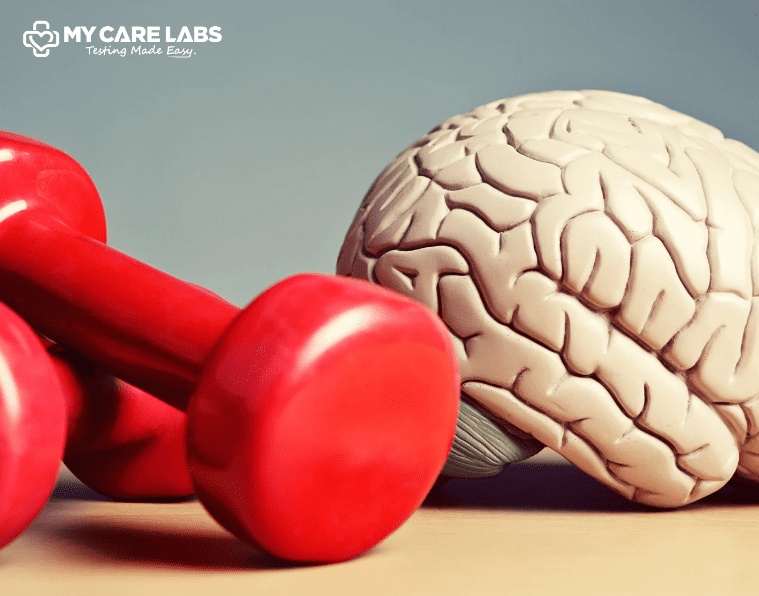The connection between mental health and gut health is a burgeoning area of research and understanding in the field of healthcare.
Emerging studies have highlighted the intricate relationship between the gut and the brain, known as the gut-brain axis.
This axis involves bidirectional communication between the central nervous system and the gut microbiota, which play a crucial role in regulating mood, emotions, and cognitive function.
Recognizing the interplay between mental health and gut health is essential for promoting overall well-being. Imbalances in gut microbiota have been linked to various mental health conditions such as anxiety, depression, and stress.
By addressing gut health through proper diet, lifestyle modifications, and targeted interventions, individuals can potentially improve their mental health outcomes and enhance their overall quality of life.
Understanding Gut Health
Definition and Importance of Gut Health:
- Gut health refers to the balance and optimal functioning of the gastrointestinal tract, including the stomach, small intestine, and colon.
- It is vital for overall health as the gut plays a crucial role in digestion, nutrient absorption, and immune function.
- A healthy gut is essential for preventing digestive disorders, maintaining a strong immune system, and supporting mental well-being.
Role of Gut Microbiota in Digestion and Immune Function:
- The gut microbiota consists of trillions of microorganisms, including bacteria, viruses, and fungi, residing in the digestive tract.
- These microorganisms aid in digestion by breaking down complex carbohydrates, synthesizing vitamins, and metabolizing nutrients.
- Additionally, gut microbiota play a pivotal role in modulating immune responses, protecting against pathogens, and maintaining intestinal barrier function.
Factors Influencing Gut Health:
- Diet: Consuming a balanced diet rich in fiber, fruits, vegetables, and probiotic-rich foods supports gut health. Processed foods, high sugar intake, and excessive alcohol consumption can disrupt the gut microbiota.
- Lifestyle: Regular physical activity, adequate sleep, and stress management promote gut health. Sedentary lifestyle, chronic stress, and inadequate sleep can negatively impact gut microbiota composition.
- Stress: Chronic stress can alter gut motility, increase intestinal permeability, and disrupt the balance of gut bacteria. Stress management techniques such as mindfulness, meditation, and relaxation exercises can support gut health.
Understanding the intricate relationship between gut health and overall well-being underscores the importance of maintaining a healthy gut microbiota through balanced diet, lifestyle modifications, and stress management strategies.
By nurturing gut health, individuals can enhance digestion, bolster immune function, and promote optimal health outcomes.
Understanding Mental Health
Definition and Importance of Mental Health:
- Mental health encompasses emotional, psychological, and social well-being, influencing how individuals think, feel, and behave.
- It is essential for overall health and functioning, as mental well-being contributes to resilience, productivity, and interpersonal relationships.
- Mental health involves coping with stress, adapting to life changes, and maintaining a positive outlook on life.
Common Mental Health Conditions:
- Anxiety: Anxiety disorders involve excessive worry, fear, and apprehension, leading to physical symptoms such as rapid heartbeat, sweating, and trembling.
- Depression: Depression is characterized by persistent sadness, loss of interest or pleasure in activities, and feelings of hopelessness or worthlessness.
- Stress: Stress results from the body’s response to challenging or demanding situations, triggering physical, emotional, and behavioral reactions.
Impact of Mental Health on Overall Well-being:
- Mental health significantly influences overall well-being and quality of life, affecting one’s ability to function effectively in daily life.
- Poor mental health can impair cognitive function, disrupt sleep patterns, and weaken immune system functioning.
- Individuals with untreated mental health conditions may experience difficulties in relationships, work, and social interactions, leading to isolation and reduced quality of life.
Understanding mental health is crucial for promoting well-being and preventing mental health disorders. By recognizing the importance of mental health, individuals can prioritize self-care, seek support when needed, and cultivate resilience in facing life’s challenges.
The Gut-Brain Axis
Explanation of the Gut-Brain Axis and Its Significance:
- The gut-brain axis refers to the bidirectional communication network connecting the gut and the brain, allowing them to interact and influence each other’s function.
- It plays a crucial role in regulating various physiological processes, including digestion, metabolism, immune response, and mental health.
- The gut-brain axis involves complex interactions between the central nervous system (CNS), enteric nervous system (ENS), gut microbiota, and neuroendocrine system.
Bidirectional Communication Between the Gut and the Brain:
- Communication between the gut and the brain occurs via neural pathways, hormonal signaling, and immune mediators.
- Signals from the brain can affect gut function, such as modulating intestinal motility, secretion of digestive enzymes, and permeability of the intestinal barrier.
- Conversely, the gut sends signals to the brain through the vagus nerve and other pathways, influencing mood, behavior, and cognitive function.
Influence of Gut Microbiota on Brain Function and Mental Health:
- The gut microbiota, composed of trillions of microorganisms residing in the gastrointestinal tract, plays a crucial role in the gut-brain axis.
- Gut microbes produce neurotransmitters, such as serotonin and dopamine, which regulate mood and behavior.
- Imbalances in gut microbiota composition, known as dysbiosis, have been linked to various mental health disorders, including anxiety, depression, and neurodevelopmental disorders.
Understanding the gut-brain axis provides insights into the intricate relationship between gut health and mental well-being. By promoting gut health through a balanced diet, probiotics, and lifestyle modifications, individuals can support optimal brain function and enhance mental health.
Effects of Gut Health on Mental Health
Research Findings on the Relationship Between Gut Health and Mental Health:
- Microbiome Composition: Numerous studies have demonstrated a clear link between the composition of gut microbiota and mental health. The gut microbiome consists of trillions of microorganisms, including bacteria, fungi, and viruses, which play a crucial role in maintaining overall health.
- Neurotransmitter Production: The gut microbiota is involved in the production of various neurotransmitters, including serotonin, dopamine, and gamma-aminobutyric acid (GABA). These neurotransmitters are essential for regulating mood, emotions, and cognitive function.
- Immune System Modulation: The gut microbiome interacts with the immune system, influencing inflammatory responses that can impact mental health. Dysregulated immune responses have been linked to conditions such as depression and anxiety.
- Brain-Gut Axis: The communication pathway known as the brain-gut axis facilitates bidirectional communication between the central nervous system and the gastrointestinal tract. Imbalances in this axis have been implicated in the development of psychiatric disorders.
How Gut Dysbiosis May Contribute to Mental Health Disorders:
- Dysregulated Neurotransmitter Production: Imbalances in gut microbiota composition, known as dysbiosis, can lead to altered production of neurotransmitters. For example, reduced levels of serotonin, often termed the “happiness hormone,” have been associated with depression and other mood disorders.
- Increased Inflammation: Dysbiosis can trigger an inflammatory response in the gut, leading to systemic inflammation that may impact the brain. Chronic inflammation has been linked to the development of various mental health disorders, including depression and schizophrenia.
- Disruption of Gut Barrier Function: Dysbiosis can compromise the integrity of the gut barrier, allowing harmful substances to enter the bloodstream. This phenomenon, often referred to as “leaky gut,” has been implicated in the pathogenesis of mental health conditions through the activation of immune responses and inflammation.
- Altered Stress Response: The gut microbiota influences the body’s response to stress through the production of stress hormones such as cortisol. Dysbiosis can disrupt this response, contributing to the development of anxiety disorders and other stress-related conditions.
Role of Gut Health in Mood Regulation and Emotional Well-being:
- Serotonin Production: The majority of serotonin, a neurotransmitter involved in mood regulation, is produced in the gut. A healthy gut microbiome is essential for maintaining optimal serotonin levels, which are crucial for emotional well-being.
- Gut-Brain Communication: The gut and the brain communicate bidirectionally through various pathways, including the vagus nerve and the release of signaling molecules. This communication influences mood, stress responses, and cognitive function.
- Impact of Diet: Diet plays a significant role in shaping the composition of the gut microbiota. Consuming a balanced diet rich in fiber, probiotics, and prebiotics can promote a diverse and healthy gut microbiome, thereby supporting positive mental health outcomes.
- Therapeutic Interventions: Strategies aimed at modulating the gut microbiota, such as probiotic supplementation, dietary modifications, and fecal microbiota transplantation, hold promise as adjunctive treatments for mental health disorders. Research in this field is ongoing, with growing interest in the potential of gut-targeted interventions for improving mental well-being.
The intricate relationship between gut health and mental health underscores the importance of considering the gut microbiome as a key player in mental well-being. Further research is needed to elucidate the mechanisms underlying this connection and to develop targeted interventions aimed at optimizing gut health for improved mental health outcomes.
Strategies for Improving Gut Health and Mental Health:
Dietary Recommendations for Gut Health, Including Probiotic and Prebiotic Foods:
- Probiotic Foods: Incorporate probiotic-rich foods into your diet, such as yogurt, kefir, kimchi, sauerkraut, and kombucha. Probiotics contain beneficial bacteria that can help restore and maintain a healthy balance of gut microbiota.
- Prebiotic Foods: Consume prebiotic foods to nourish the beneficial bacteria in your gut. Examples include garlic, onions, leeks, bananas, asparagus, and whole grains. Prebiotics serve as fuel for probiotics, promoting their growth and activity.
- Fiber-Rich Foods: Increase your intake of fiber-rich foods, such as fruits, vegetables, legumes, and whole grains. Fiber supports digestive health by promoting regular bowel movements and providing substrates for the growth of beneficial gut bacteria.
- Diversify Your Diet: Aim for a diverse range of foods to promote a diverse gut microbiota. Incorporating a variety of plant-based foods ensures you’re exposed to different types of beneficial bacteria and nutrients that support gut health.
Lifestyle Modifications, Such as Stress Management Techniques and Regular Exercise:
- Stress Management: Practice stress-reduction techniques such as mindfulness meditation, deep breathing exercises, yoga, or tai chi. Chronic stress can negatively impact gut health by altering gut microbiota composition and increasing intestinal permeability.
- Regular Exercise: Engage in regular physical activity to support both gut and mental health. Exercise has been shown to promote a healthy gut microbiota, reduce inflammation, and alleviate symptoms of anxiety and depression.
- Adequate Sleep: Prioritize sufficient sleep, aiming for 7-9 hours per night. Poor sleep quality and inadequate sleep duration have been linked to dysbiosis and an increased risk of mental health disorders.
- Limiting Alcohol and Tobacco: Reduce or eliminate alcohol consumption and avoid smoking, as these habits can disrupt gut microbiota balance and exacerbate mental health issues.
Importance of Seeking Professional Support for Mental Health Concerns:
- Therapy and Counseling: If you’re experiencing mental health concerns, consider seeking support from a mental health professional such as a therapist or counselor. Therapy can provide valuable tools and coping strategies for managing symptoms and improving overall well-being.
- Medication Management: In some cases, medication may be necessary to manage mental health conditions effectively. Consult a psychiatrist or primary care provider to discuss medication options and ensure safe and appropriate treatment.
- Nutritional Counseling: Work with a registered dietitian or nutritionist to develop a personalized nutrition plan that supports both gut health and mental health goals. They can provide guidance on dietary modifications and supplementation tailored to your individual needs.
- Integrated Approach: Consider an integrated approach to mental health care that addresses both psychological and physiological factors. Collaborate with a multidisciplinary team of healthcare providers, including mental health professionals, primary care physicians, and nutrition experts, to optimize treatment outcomes.
Adopting dietary and lifestyle strategies to support gut health can have profound effects on mental well-being.
However, it’s essential to recognize the interconnectedness of gut health and mental health and to seek professional support when needed to address underlying mental health concerns effectively.
By incorporating these strategies into your daily routine, you can promote a healthy gut-brain axis and enhance overall quality of life.
Mental Health and Gut
- Understanding the intricate connection between mental health and gut is essential for holistic well-being.
- Mental health and gut health are intricately linked through the gut-brain axis, a bidirectional communication system between the gastrointestinal tract and the central nervous system.
- Research indicates that imbalances in gut microbiota can contribute to mental health disorders, such as depression and anxiety.
- Conversely, poor mental health, such as chronic stress and anxiety, can disrupt gut health by altering gut microbiota composition and increasing inflammation.
- Adopting strategies to support mental health and gut health simultaneously can promote overall wellness.
- These strategies may include dietary modifications, such as consuming probiotic and prebiotic foods to support a healthy gut microbiome.
- Additionally, stress management techniques, regular exercise, and sufficient sleep are crucial for maintaining both mental and gut health.
- Seeking professional support from mental health professionals and healthcare providers can also be beneficial in addressing mental health and gut-related concerns.
- By prioritizing mental health and gut health, individuals can take proactive steps towards improving their quality of life and overall well-being.
Mental Health and Gut Microbiome
Understanding the intricate relationship between mental health and the gut microbiome is crucial for comprehensive well-being. Here’s a breakdown of key points highlighting this connection:
The Gut Microbiome’s Impact on Mental Health:
Research suggests that the gut microbiome, the collection of microorganisms living in the gastrointestinal tract, plays a significant role in mental health. The composition and diversity of the gut microbiome can influence various aspects of mental well-being, including mood, stress response, and cognition.
Bidirectional Communication:
The gut-brain axis serves as a communication pathway between the gut and the brain. This bidirectional communication allows for the exchange of signals and molecules that impact both mental health and the gut microbiome. Disruptions in this axis can lead to imbalances in gut microbiota and contribute to mental health disorders.
Role of Gut Microbes in Neurotransmitter Production:
Gut microbiota are involved in the production of neurotransmitters, such as serotonin and gamma-aminobutyric acid (GABA), which play key roles in regulating mood and emotions. Imbalances in gut microbiota can disrupt neurotransmitter production, potentially contributing to conditions like depression and anxiety.
Influence of Gut Microbiome on Stress Response:
The gut microbiome influences the body’s response to stress through the production of stress hormones like cortisol. Dysbiosis, or imbalance in gut microbiota, can affect stress response pathways and exacerbate symptoms of anxiety and depression.
Impact of Diet on Mental Health and Gut Microbiome:
Dietary factors play a crucial role in shaping the composition of the gut microbiome and, consequently, mental health. Consuming a diet rich in fiber, probiotics, and prebiotics supports a diverse and healthy gut microbiome, which in turn can positively influence mental well-being.
Stress and Gut Microbiome Interactions:
Chronic stress can disrupt the balance of gut microbiota and increase intestinal permeability, leading to a condition known as “leaky gut.” This can trigger immune responses and inflammation, which have been linked to mental health disorders.
Therapeutic Interventions:
Targeted interventions aimed at modulating the gut microbiome show promise in improving mental health outcomes. These interventions may include probiotic supplementation, dietary modifications, and fecal microbiota transplantation. By restoring balance to the gut microbiome, these therapies can potentially alleviate symptoms of mental health disorders.
The connection between mental health and the gut microbiome underscores the importance of considering gut health in mental health interventions.
By addressing factors that influence the gut microbiome, such as diet, stress, and therapeutic interventions, individuals can support both their mental well-being and gut health.
Further research in this area holds the potential to uncover novel therapeutic approaches for managing mental health disorders through targeting the gut microbiome.






